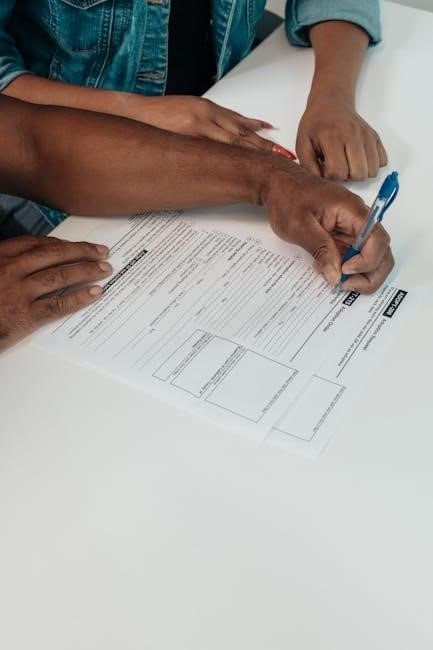A Power of Attorney in Spanish‚ known as poder notarial‚ is a legal document authorizing someone to act on your behalf in legal or financial matters. It is essential for managing affairs in Spain‚ ensuring your interests are represented effectively.
Understanding the Basics of Power of Attorney
A Power of Attorney (Poder Notarial) is a legal document where one person (the grantor or principal) authorizes another (the agent or apoderado) to act on their behalf in legal‚ financial‚ or personal matters. It allows the agent to make decisions and undertake actions as if they were the grantor‚ ensuring affairs are managed effectively. The document is essential for individuals needing representation in Spain‚ whether for property transactions‚ banking‚ or other legal processes. It can be general‚ granting broad authority‚ or special‚ limiting powers to specific tasks. A notary public must witness the document to validate it‚ making it legally binding and enforceable.
Why a Spanish Power of Attorney Form is Necessary
A Spanish Power of Attorney form is crucial for anyone needing legal representation in Spain. It allows individuals to delegate authority to an agent‚ ensuring their interests are protected during transactions like property purchases‚ banking‚ or tax matters. Without it‚ third parties may refuse to accept decisions made on your behalf. The form must be notarized‚ adhering to Spanish legal standards‚ to validate its enforceability. It is particularly vital for non-residents or those unable to be present in Spain‚ providing a secure and recognized way to manage affairs efficiently. This document prevents legal complications and ensures smooth processes in all official dealings.

Types of Power of Attorney Forms in Spanish
Spanish Power of Attorney forms include General‚ Special‚ and Durable options‚ each designed for specific legal needs‚ ensuring tailored authority for various personal and financial matters.
General Power of Attorney (Poder Notarial General)
A General Power of Attorney grants broad authority to an agent‚ enabling them to handle various legal‚ financial‚ and administrative tasks on your behalf. This includes managing bank accounts‚ buying or selling property‚ and conducting business operations. It is often used when someone needs comprehensive representation‚ such as when they are unavailable or incapable of managing their affairs personally. The document must be notarized and typically requires witnesses to ensure its validity. It remains in effect until revoked‚ making it a flexible yet powerful tool for ensuring continuity in personal and business matters.
Special Power of Attorney (Poder Notarial Especial)
A Special Power of Attorney is tailored to grant specific‚ limited authority to an agent‚ allowing them to act on your behalf in defined situations or transactions. Unlike the general form‚ this document outlines precise powers‚ such as handling a real estate sale‚ managing a legal case‚ or overseeing a business deal. It is ideal for individuals who need representation in a particular matter without broader authorization. The agent’s authority is restricted to the scope detailed in the document‚ ensuring clarity and control for the grantor. This form is often used for temporary or singular events‚ providing peace of mind with targeted representation.
Durable Power of Attorney (Poder Notarial Duradero)
A Durable Power of Attorney (Poder Notarial Duradero) remains effective even if the grantor becomes incapacitated‚ ensuring continuous representation in legal and financial matters. It is often used for long-term planning‚ particularly in cases of potential incapacity or extended absences; This type of POA allows the agent to manage property‚ finances‚ and personal affairs seamlessly‚ even when the grantor cannot act independently. The document must explicitly state its durability‚ and the grantor must have legal capacity when signing. A notary public and witnesses are typically required to validate the document‚ ensuring its legality and enforceability. It is a critical tool for safeguarding one’s interests in uncertain circumstances. Consulting a legal professional is recommended to tailor the document to specific needs.

Legal Requirements for a Spanish Power of Attorney
A Spanish Power of Attorney must be notarized‚ witnessed‚ and signed by the grantor with legal capacity‚ ensuring its validity and enforceability under Spanish law.
Who Can Be Appointed as an Agent (Apoderado)
The agent‚ or apoderado‚ must be a person of legal age with full legal capacity. They should not be incapacitated or have conflicts of interest. Non-residents can also be appointed‚ provided they have a valid Spanish tax identification number (NIE). The agent must accept the role‚ either explicitly or implicitly through their actions. It is crucial that the agent is trustworthy and understands their responsibilities to act in the grantor’s best interests. If the agent resides outside Spain‚ additional procedures‚ such as apostillation‚ may be required to validate their authority. The chosen agent must be capable of managing the specific tasks entrusted to them.
Role of a Notary Public in Spain
The notary public in Spain plays a crucial role in the creation of a Power of Attorney. They witness the signature of the grantor‚ ensuring the document is executed voluntarily and in accordance with Spanish law. The notary verifies the identity and legal capacity of the grantor and confirms that the document complies with legal requirements. They also formalize the agreement‚ making it legally binding. In some cases‚ the notary may assist in drafting the document or ensuring it is free from errors. Their involvement guarantees the authenticity and enforceability of the Power of Attorney‚ making it a critical step in the process.
Documentation Needed for the Process
To complete a Spanish Power of Attorney‚ specific documents are required. A completed and signed application form is essential‚ along with valid identification such as a DNI‚ passport‚ or foreign ID. Additional documentation may include proof of address and‚ in some cases‚ a payment receipt for applicable fees. All documents must be in Spanish or officially translated; The notary may request copies of these documents for verification. Ensuring all paperwork is accurate and compliant with legal standards is crucial for the process to proceed smoothly. Proper documentation guarantees the validity and enforceability of the Power of Attorney in Spain;

How to Complete a Spanish Power of Attorney Form
Fill out the form accurately‚ providing personal details and the agent’s information. Ensure all sections are completed clearly to avoid delays. Notarization is required for validation.

Step-by-Step Guide to Filling Out the Form
Begin by downloading the official Spanish Power of Attorney PDF from a trusted source. Start with personal details‚ including your full name‚ ID number‚ and address. Next‚ specify the agent’s information‚ ensuring accuracy. Clearly outline the powers granted‚ whether general or specific. Include the duration of the authority if applicable. Sign each page‚ and have the document notarized by a Spanish notary. Attach required documents‚ such as a copy of your ID. Finally‚ submit the form to the relevant authorities for processing. Ensure all sections are legible and completed to avoid any legal issues.

Importance of Notarization and Signature
Notarization and signature are critical for validating a Spanish Power of Attorney. A notary public verifies the grantor’s identity and ensures the document is executed voluntarily. The grantor must sign in the notary’s presence‚ confirming their consent. This process guarantees the document’s authenticity and legal enforceability. Without proper notarization‚ the form may be deemed invalid‚ leading to potential legal challenges. The notary’s seal and signature confirm compliance with Spanish legal standards‚ ensuring the agent’s authority is recognized by authorities. This step is essential for preventing fraud and ensuring the document’s legitimacy in all legal and administrative proceedings in Spain.
Submitting the Form to Relevant Authorities

After completing and notarizing the Spanish Power of Attorney‚ the next step is submitting it to the relevant authorities. This ensures the document is officially recognized and enforceable. Depending on the purpose‚ the form may need to be filed with public registries‚ tax offices‚ or specific government agencies. For international use‚ it might require legalization through the Spanish Ministry of Justice or the Hague Apostille. Submitting the form promptly guarantees that the agent can act without delays. Proper registration also ensures that third parties‚ such as banks or administrative offices‚ accept the document as valid. Timely submission is crucial for maintaining legal efficacy.

Common Mistakes to Avoid
Common errors include incomplete forms‚ lack of proper witnessing‚ or missing notarization. Ensure all fields are filled accurately and avoid granting overly broad powers without understanding their implications.
Ensuring the Form is Correctly Witnessed
Correct witnessing is crucial for the validity of a Spanish Power of Attorney. The form must be signed in the presence of a notary public (notario) and at least one witness. The witness must be of legal age‚ mentally capable‚ and not directly involved in the matters covered by the Power of Attorney. Ensure the witness signs and provides their identification details. The notary verifies the authenticity of the signatures and the grantor’s understanding of the document. Without proper witnessing‚ the document may be deemed invalid‚ leading to legal complications. Always double-check the witnessing process to avoid issues.
Understanding the Scope of Authority Granted
Understanding the scope of authority granted in a Spanish Power of Attorney is essential to ensure it aligns with your needs. The document specifies whether the powers are general or limited to specific matters‚ such as financial‚ legal‚ or real estate decisions. It is crucial to clearly define the authority to prevent misuse. Broad powers offer flexibility‚ while narrow powers restrict the agent’s actions. Always tailor the scope to your situation and seek legal advice to avoid overstepping or omitting critical areas. Ambiguities can lead to legal challenges‚ so clarity is vital. Ensure the document reflects your intentions accurately. This ensures your rights are protected and your wishes are honored.

Where to Find a Spanish Power of Attorney PDF
Spanish Power of Attorney PDFs can be found on official government websites‚ such as the Spanish Ministry of Justice‚ and legal template providers like PDF Expert. These platforms offer downloadable forms tailored to Spanish legal requirements‚ ensuring accuracy and compliance. Always verify the source to ensure the document is valid and suitable for your needs. Additionally‚ some law firms provide free templates‚ which can be a reliable option. Ensure the form aligns with Spain’s legal standards to avoid any issues. Using these resources guarantees access to authentic and legally binding documents. This approach simplifies the process of obtaining the necessary form efficiently and securely.
Official Government Websites
Official government websites are a reliable source for obtaining a Spanish Power of Attorney PDF. The Spanish Ministry of Justice and regional government portals often provide downloadable templates that comply with legal requirements. These forms are regularly updated to reflect current laws and are free to access. Additionally‚ some regional governments in Spain‚ such as the Generalitat de Catalunya or the Comunidad de Madrid‚ offer specific templates tailored to their jurisdiction. Using official government websites ensures the form is authentic and legally binding. Always verify the source to avoid fraudulent or outdated documents. This approach guarantees compliance and simplifies the process of obtaining the necessary form.
Legal Template Providers
Reputable legal template providers offer Spanish Power of Attorney PDF forms tailored to specific needs. Platforms like LegalZoom or Rocket Lawyer provide customizable templates‚ though they may not always offer Spanish versions. In Spain‚ websites like Notaría Española or Expansión Jurídica often supply authentic and up-to-date forms. These templates are designed to meet legal standards and cover various scenarios‚ such as property management or financial affairs. While convenient‚ it’s crucial to verify the template’s compliance with Spanish law and ensure it is appropriately notarized. Consulting a legal professional can help customize the document to fit individual circumstances effectively. Always prioritize templates from trusted sources to avoid errors or legal issues.

Legal Implications of a Power of Attorney in Spain
A Power of Attorney in Spain carries significant legal implications‚ as misuse can lead to penalties. Compliance with Spanish law and proper notarization are essential to prevent legal disputes.
Duration and Revocation of the Power of Attorney
A Spanish Power of Attorney can be either temporary or indefinite‚ depending on the terms specified. It remains in effect until revoked‚ which typically requires a written declaration. The principal can revoke the document at any time‚ ensuring they retain full control. Legal steps must be taken to formally revoke the POA‚ including notifying the agent and relevant authorities. Once revoked‚ the agent’s authority ceases‚ and any actions taken after revocation are considered unauthorized. Proper documentation ensures clarity and protects all parties involved. Revocation must be communicated clearly to avoid legal complications.
Consequences of Misuse
Misusing a Power of Attorney in Spain can lead to severe legal consequences. If an agent exceeds their authority‚ they may face criminal charges‚ fines‚ and liability for damages. The principal can also revoke the document and seek compensation for any financial losses. Misuse may result in the invalidation of actions taken under the POA‚ potentially causing legal or financial harm to all parties involved. It is crucial for both the principal and agent to understand and respect the boundaries of the authority granted to prevent legal repercussions and ensure the document is used responsibly and ethically.
